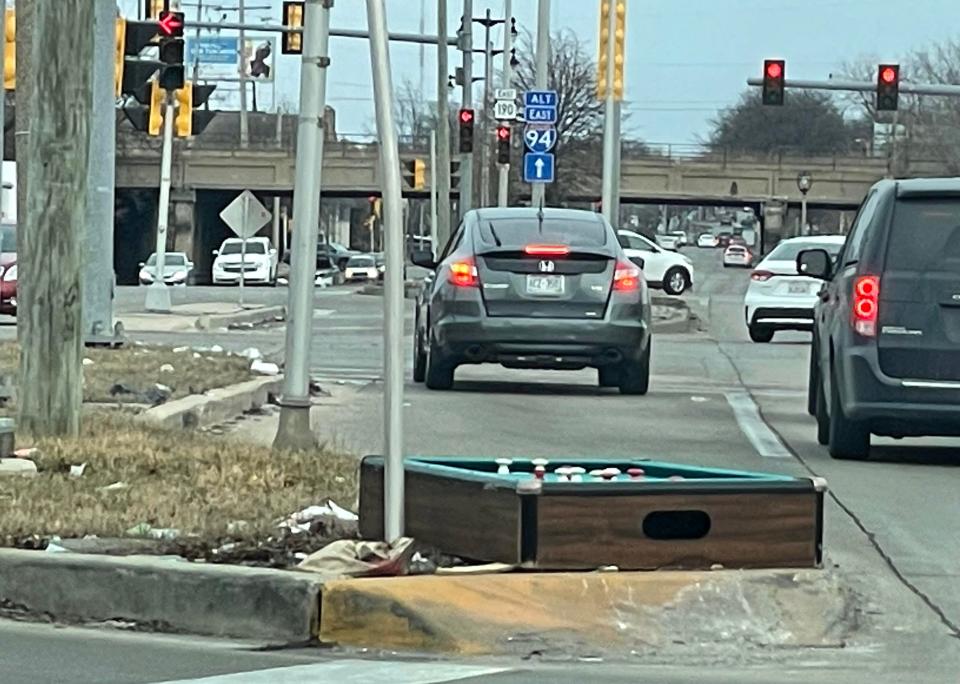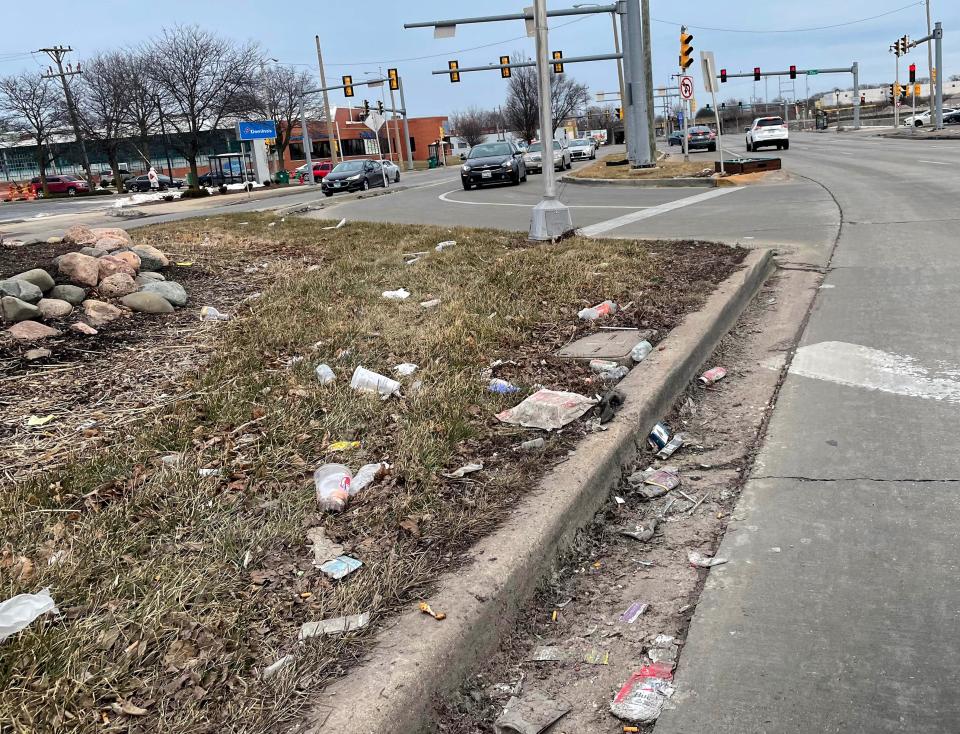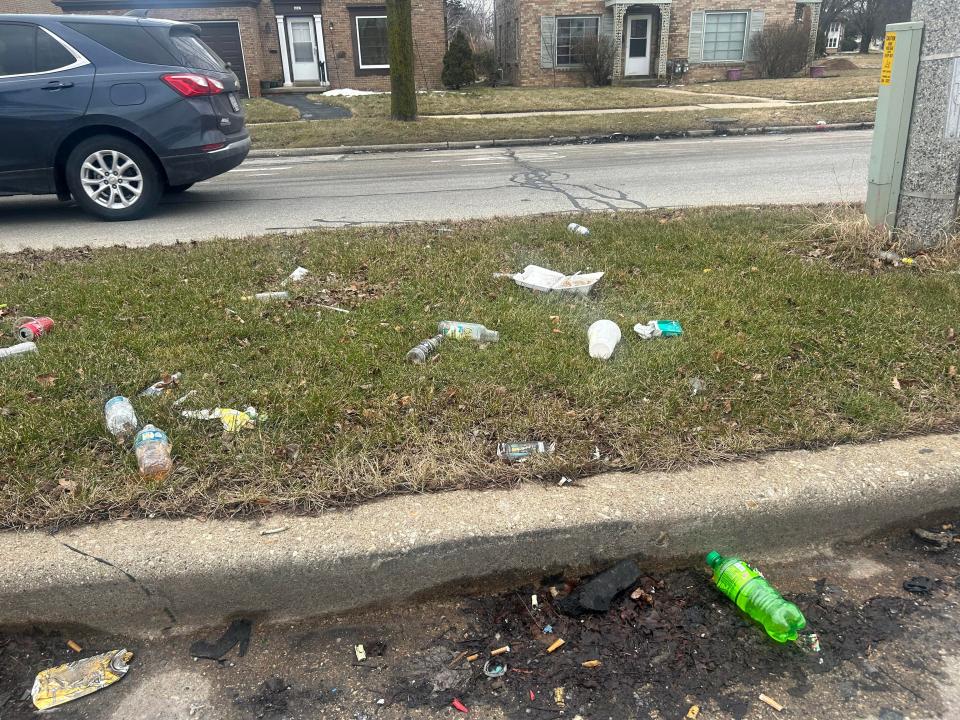'Trouble don't like cleanliness.' Litterbugs should have to clean up their messes
My biggest pet peeve is watching drivers toss garbage out of vehicles. It’s lazy, nasty, and you wonder why they didn’t save their trash until they got to a garbage can.
Drive down most streets or alleys in the city, and you will likely see tires, bumpers from crash scenes, broken glass, fast-food wrappers, mattresses, and glass bottles.
“This is the worst I’ve seen it in years,” said OJ Kelly, 49, who lives on North 40th and Hampton Ave. “It’s definitely a mentality thing, where people don’t value themselves or our community.”
While shootings, homicides, and reckless driving garner most of the headlines, mounting trash throughout our city deserves more attention because there's more to a clean city than just the aesthetics. Studies show a cleaner city is a healthier and safer city. It may not be a coincidence that Milwaukee broke its homicide record three years in a row and the litter, anecdotally, continues to increase.
“Trouble don’t like cleanliness,” said Andre Lee Ellis, a community activist, who has mentored boys through his urban gardening and outdoor clean ups.

Studies show cleanliness more than surface deep issue
In times of high stress, cleaning can have a powerful effect on your mental well-being and safety. A 2018 study published in the Proceedings of the National Academy of Sciences, a journal of the National Academy of Sciences, showed urban neighborhoods where lots were cleaned up had a 29% reduction in gun violence; a 22% drop in burglaries; and a 30% reduction in nuisance complaints.
Ellis, who operated “We Got This Garden,” urban garden in the 53206 ZIP code was not surprised by the findings. His program gave boys ages 12-17 the opportunity to learn how to garden; talk to male mentors; and clean up their neighborhood, while earning money every Saturday in the summer.
For Ellis, the cleaning component was just as important as the mentoring because he wanted to show Black boys doing positive things in the community to dispel the myths some have about our children.
“When the streets are clean and there’s no trash in front of the house, you don’t feel as stressed. You are not willing to fight someone as quickly and maybe that can save a life,” Ellis said.
In December 2011, a month before Ellis moved off North 9th and West Ring streets, the area was home to the second-highest crime block in Milwaukee. Today, police say it is no longer in the top 50.

I’m sure some of that could be related to boys and mentors cleaning up the area each year over the summer. Yet even with the efforts of many, Ellis said the trash in many neighborhoods continues to increase.
There are several reasons for the litter. Not having enough city workers to keep our medians clean. The low homeownership rate in Black and brown communities; and landlords being absentee just to name a few.
But the main reason for trash is the behavior of some of our residents.
“It starts in the home. My mother used to say keep your house clean and people will respect it but there are people who never learned that lesson and you can see it,” Kelly said.
Changing the litterbug behavior will take a culture change. This means moving from a "me" mentality to a "we" mentality that cares about others.
Kelly said if the status quo remains the same, "We will never have strong Black and brown neighborhoods, we will only have some strong Black and brown blocks."
Ellis agreed, but warned against just blaming youth alone.
“The people I see tossing trash out of their cars are not kids, these are adults so I don’t know what it will take to reach them because you know what, they don’t do that when they are in the suburbs,” he said.
Fines have failed. Why not make them clean up their mess?
No part of the city is immune to litter, but some areas like Capitol Drive, Sherman Blvd., and areas before you get on the highways are prone to more trash because of the sheer volume of vehicles that travel these areas daily.
Soon many businesses, aldermen, and community activists will announce their community clean ups, and while these events attract dozens of volunteers who do their best to leave the areas pristine, weeks later the same trash appears.
“It’s a mentality thing and it’s something we need to talk about,” said Ald. Khalif Rainey.

In April 2019, Milwaukee raised its litter fine to $500. This is up from the $25 for the first offense and $50 for subsequent offenses. Four years later, we can safely say the fines are not working.
Here’s an idea, instead of fining a litterbug $500, why not force them to work off that “fine” by making them volunteer in a neighborhood cleanup to work off the fine?
With the state minimum wage at $7.25 an hour, getting a litterbug to volunteer 69 hours of cleaning, or what it would take to work off a $500 fine, is the best way to break up a bad habit.
The way the city looks right now, I’m sure a person could fill up a lot of trash bags in that time, while at the same time creating a safer city.
This can be a way for the city to apply a little bit of that home training some people never received.
James E. Causey started reporting on life in his city while still at Marshall High School through a Milwaukee Sentinel high school internship. He's been covering his hometown ever since, writing and editing news stories, projects and opinion pieces on urban youth, mental health, employment, housing and incarceration. Most recently, he wrote about a man who went to prison as a child for a horrific crime in Life Correction: The Marlin Dixon story. Released at age 32, Dixon’s intent on giving his life meaning. Other projects include "What happened to us?" which tracked the lives of his third-grade classmates, and "Cultivating a community," about the bonding that takes place around a neighborhood garden. Causey was a health fellow at the University of Southern California in 2018 and a Nieman Fellow at Harvard University in 2007. Email him at jcausey@jrn.com; follow him on Twitter @jecausey
This article originally appeared on Milwaukee Journal Sentinel: Milwaukee can help reduce gun violence with effort to clear trash.

